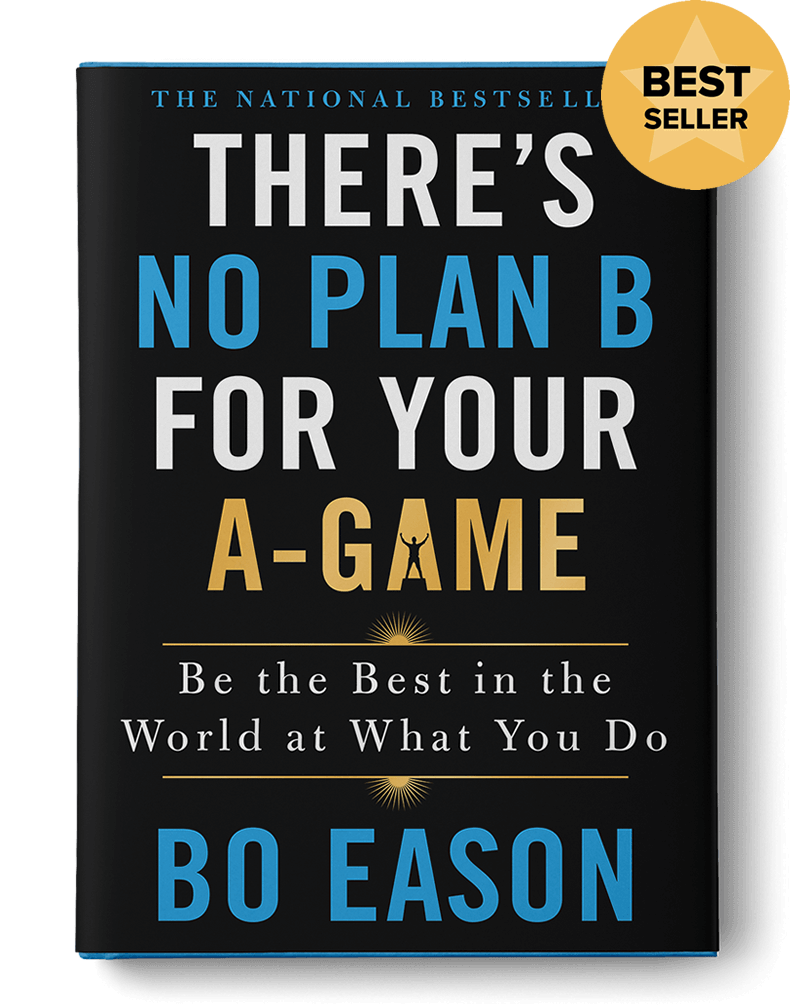Bo: Okay, we’re here talking with Dr. Joan Rosenberg. Joan, let’s flip the tables again here. Do you have a question?
Joan: I do. We’ve been engaged in this discussion about the difference between being obsessed and being the best. So how do you differentiate the two?
Bo: Wow. I often use the term “obsessed” or “haunted”—that I’ve been haunted or obsessed with this term my whole life because my dad used to wake us up and tell us we were the best. So we’d wake up and that would be the first thing you’d hear for 40 years or whatever it was. There are a couple of differences. One, ‘The Best’ is very inclusive. It brings people with you. At my events, often the mindset I have to set in those rooms is that it’s not about your story and how good you are on stage. The mindset of this group is how good is the person going to be to your left and how good are you going to make the person to your right? And so we fight shoulder to shoulder like that, for each other. When we do that, the level just goes through the roof. You become the best in the world at you, at what you do, because you’re fighting for others. I think obsession, the sickness of that, is it’s this sense of narcissism, like a megalomaniac. “I’m going to get this. I don’t see anything. I’m going to leave 100 dead bodies in my wake.” I think “The Best” brings people with you. They go to the top with you. It’s very inclusive.
Joan: So it’s not just the best in me. What ends up happening is that I also see the best in you. So I invite you to come along on that same journey.
Bo: Right, that’s why every time I talk about it and every time I’ve set out on one of these “best” journeys, people come with me. Whether it’s one of my kids or all of my kids, could be friends, could be teammates. Whatever I’ve kind of set my mind, I’d like to go to the very top of that field right there, people then see themselves inside of that story and they come along too. That’s why it’s so inclusive. It’s not like, “Oh, I’ve got to be better than Joan and so she can’t come along. Only I can be the best.”
Joan: Right. So it’s not about domination over, it’s not about control or coercion or force.
Bo: No.
Joan: It’s that we actually share in the experience of the pursuit of what is us, again, kind of being the most fully expressed or being our best. And you’ve also talked about kind of resolve in the same way.
Bo: Yeah. There’s got to be a resolve. What if you just resolved the fact that this is as famous as you’re ever going to get, right now, and, kind of be resolute about it. And, really, bury that notion. Like, get rid of it. Have a little ceremony and bury that. It just seems like most people are trying to get more notoriety or more famous or more money. And what if you just resolved the fact that this is where you live—right here. Now, you can create and you may make more money, you probably will, and you may get more famous, but that’s not your aim. Your aim is to be the best.
Joan: Right. You actually change the focus to, again, living the most creative, living the most fully expressed, being the absolute best, and again, you used the word ‘generosity’ before, being the most generous of your whole spirit that you can be but that is the singular focus.
Bo: So in that way we’ve turned this whole obsession and this whole haunting up on its ear because now we’re talking about to be the best you also have to be the most generous. There are so many examples of this throughout history. Just look at the people who we think of whether it’s the best football player, the best ballet dancer, the best gymnast or the best cellist, they were also the most generous. They gave of themselves.
Joan: Fully.
Bo: Yeah. And then people around them played up to their standard and went all the way with them.
Joan: That’s right.
Bo: Isn’t that a better way to live?
Joan: Absolutely.
Bo: Then to be, “Well, you’re obsessed and that’s a bad thing so that’s unhealthy.” Therefore, keeping yourself off the field.
Joan: Right. In prior conversation, the notion is that if I call you out as obsessed—you’re actually in pursuit of the best. But if I call you out as obsessed, I’m doing that so I don’t have to commit and play the game.
Bo: I totally agree with that.
Joan: I just took myself right off the field because then I don’t have to be the most generous. I don’t have to fall down and scrape my knees. I don’t have to have you see the raw insides. Nothing. I’ve just pulled myself right out of the game.
Bo: And think about that. Why would somebody take themselves out of the game?
Joan: They don’t want to get hurt.
Bo: Right?
Joan: Yep.
Bo: So at the end of our lifetime, our last breath, probably the person who’s had their heart broken the most or been hurt the most, is probably going to be the winner.
Joan: Yes.
Bo: So we’re living our lives kind of backwards. You know? Kind of with the wrong idea in place because if you pursue the best, I guarantee you’re going to get a bloody nose. I guarantee there’s going to be a ton of obstacles in your way. And you’ll be called “out of balance,” you’ll be called “obsessed” and whatever else because the people on the sidelines, the non-participants, will point you out. That’s the game.
Joan: That is the game. And so, go for it fully. Maintain that resolve. And go for the best.

